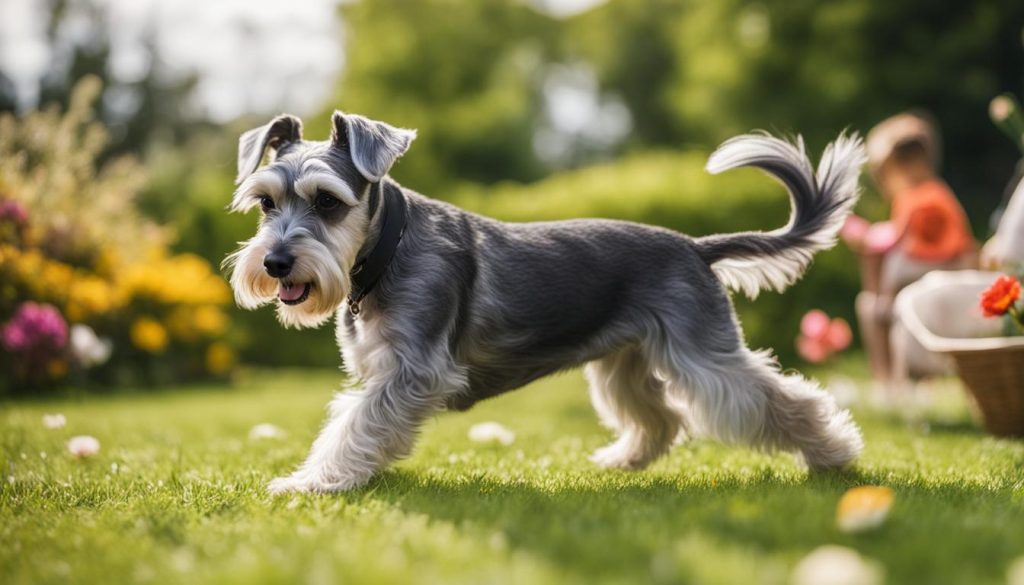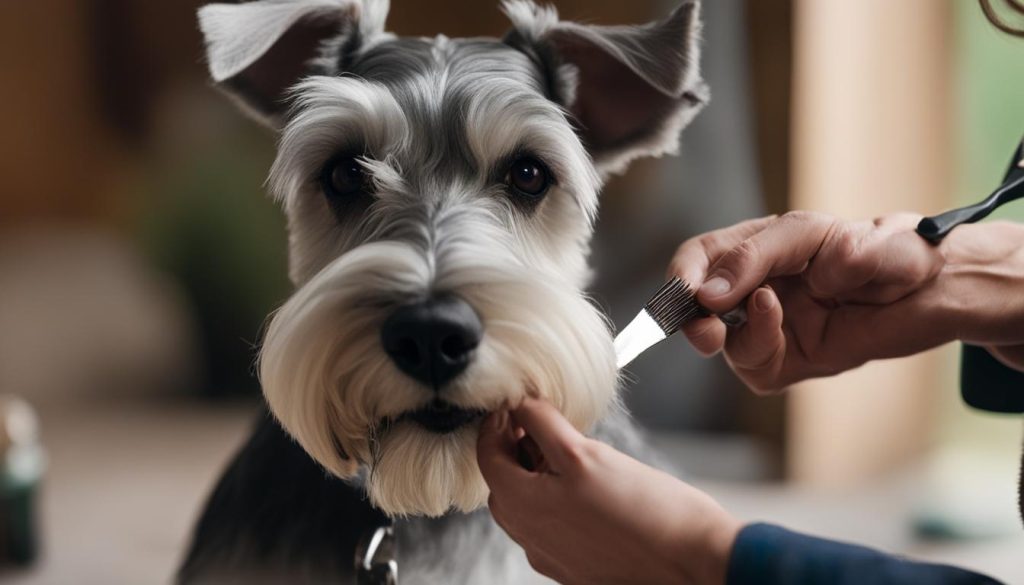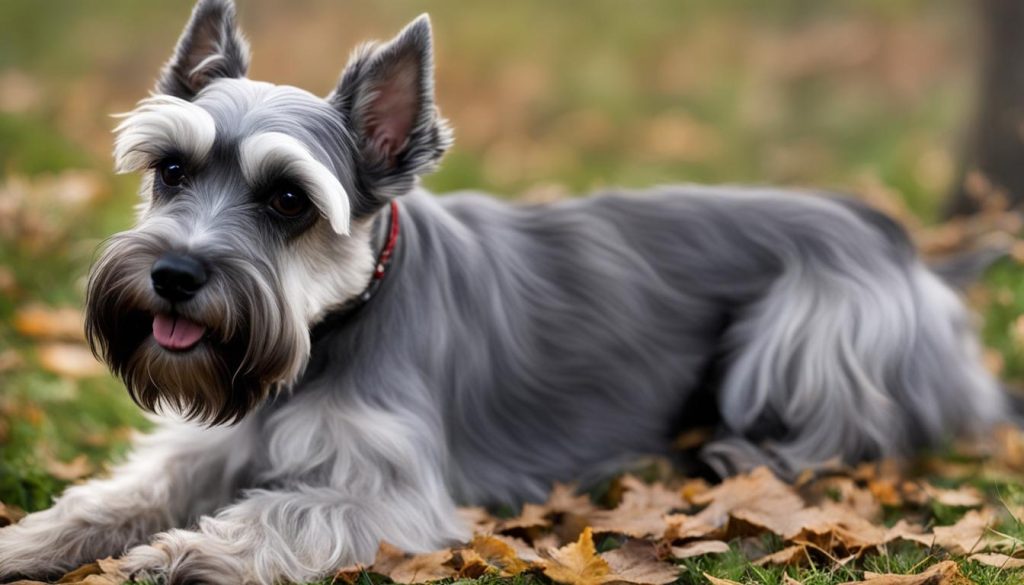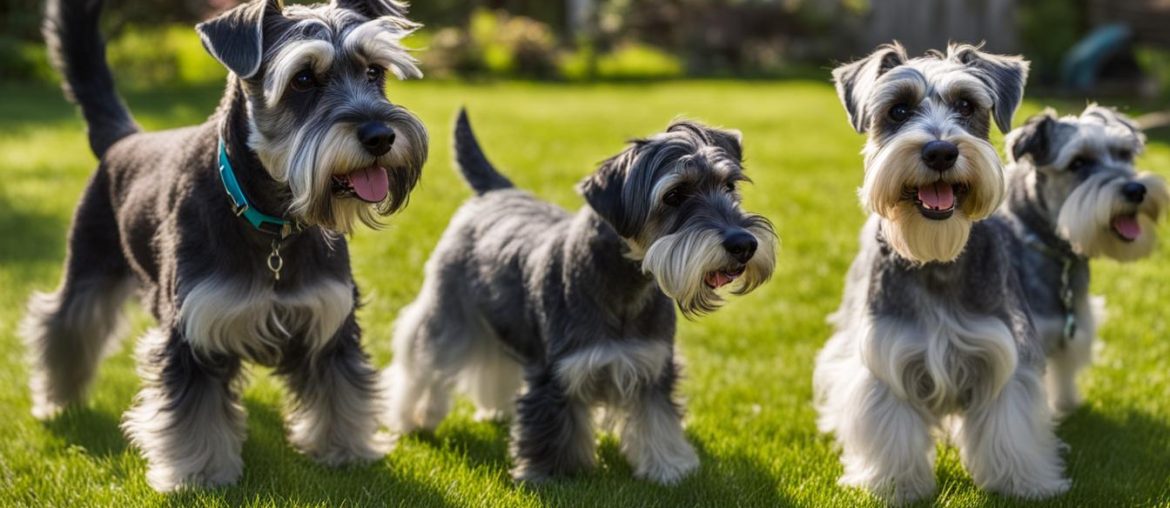When it comes to finding the perfect family dog, there are several factors to consider. Are they friendly? Are they good with kids? Do they have the right temperament? These are all important questions that need answers. In this article, we will explore whether Miniature Schnauzers are good family dogs and uncover the truth about their breed characteristics.
Key Takeaways:
- Miniature Schnauzers are small, intelligent, and active dogs.
- They have a friendly and alert temperament, making them suitable for families.
- Miniature Schnauzers require moderate exercise and are relatively easy to train.
- Proper socialization is important for Miniature Schnauzers to develop good manners.
- They have a medium-length, wiry coat that requires regular grooming.
Miniature Schnauzers as Family Companions

When it comes to finding the perfect family pet, Miniature Schnauzers are an excellent choice. With their friendly and alert temperament, they are well-suited for families of all sizes. These intelligent and adaptable dogs thrive on companionship and enjoy being included in family activities.
Miniature Schnauzers are known to be good with children, making them an ideal choice for families with kids. They can get along well with other pets too, as long as proper introductions are made. Their affectionate nature helps them form strong bonds with their human family members, bringing joy and love into the household.
Whether you live in an apartment or a larger home, Miniature Schnauzers can adapt to various living environments. However, they do require regular exercise to keep them physically and mentally stimulated. Providing them with 30-60 minutes of exercise per day, such as walks, runs, and playtime, is essential to their overall well-being.
| Miniature Schnauzer as a Family Pet | Summary |
|---|---|
| Temperament | Friendly and alert |
| Suitability for Families | Good with children and other pets |
| Exercise Needs | Require 30-60 minutes of exercise per day |
When considering a Miniature Schnauzer as a family pet, it’s important to note their grooming needs. They have a medium-length, wiry coat that requires regular brushing to prevent matting. Hand-stripping every 4-6 weeks helps maintain the texture and health of their coat. Regular grooming sessions also provide an opportunity to check for any skin issues or abnormalities.
To summarize, Miniature Schnauzers possess the temperament and qualities that make them excellent family companions. With their friendly nature, adaptability, and love for their human family, they bring joy and happiness to households. However, it’s important to provide them with proper exercise and grooming to ensure their overall well-being. Whether you live in a small apartment or a spacious home, a Miniature Schnauzer can be a wonderful addition to your family.
Training and Socialization
Training and socialization are essential for ensuring that Miniature Schnauzers become well-behaved and well-adjusted family pets. These intelligent dogs are eager to please and relatively easy to train, especially when positive reinforcement methods are used. Starting training at a young age is important to establish good behaviors and prevent any potential behavior issues from developing.
When it comes to socialization, Miniature Schnauzers benefit from early exposure to a variety of people, animals, and environments. This helps them develop good manners and ensures that they can interact positively with other dogs and strangers. As Miniature Schnauzers can be fearless when around other dogs, it’s important to introduce them to other dogs in a controlled and positive manner.
Overall, consistent and positive training techniques, along with early socialization, will help Miniature Schnauzers grow up to be confident, well-behaved, and friendly family companions.
Exercise and Activity Level
When it comes to exercise and activity levels, Miniature Schnauzers are a breed that thrives on being active. They have moderate energy levels and require regular physical and mental stimulation to stay happy and healthy. It is essential to provide them with enough exercise to prevent boredom and maintain their overall well-being.
Miniature Schnauzers typically need around 30-60 minutes of exercise per day. This can be achieved through a combination of walks, runs, and playtime in a secure area. Engaging in activities like fetching, playing with toys, or even participating in dog sports can help fulfill their exercise requirements. Please be aware that the specific exercise needs may vary depending on the individual dog’s age, health, and overall energy level.
Proper exercise not only helps Miniature Schnauzers maintain a healthy weight but also contributes to their mental stimulation. As intelligent dogs, they enjoy tasks that challenge their minds. Incorporating training sessions, puzzle toys, or interactive games into their exercise routine can help keep them mentally sharp and prevent behavioral issues that may arise from boredom or frustration.
| Exercise Needs | Activity Level |
|---|---|
| 30-60 minutes of exercise per day | Moderate |
In summary, Miniature Schnauzers are an active breed that requires regular exercise and mental stimulation to thrive. Their exercise needs can be met through a variety of activities, including walks, playtime, and interactive games. By providing them with the appropriate amount of exercise, you can help ensure that they lead a happy and fulfilling life as a beloved member of your family.
Miniature Schnauzer Grooming and Coat Care

Proper grooming is essential for maintaining the health and appearance of your Miniature Schnauzer’s coat. With their medium-length, wiry coat, regular grooming will keep their fur looking neat and reduce the risk of matting.
Here are some important grooming practices to keep in mind:
- Brushing: Miniature Schnauzers should be brushed daily to prevent tangles and matting. Use a slicker brush or a comb with wider teeth to remove loose fur and debris from their coat.
- Coat Care: Miniature Schnauzers have a unique double coat that requires specific attention. Hand-stripping, a process of plucking or pulling out dead hair, helps maintain the texture and health of their fur. This should be done every 4-6 weeks by a professional groomer who specializes in hand-stripping.
- Nail Care: Regular nail trimming is crucial to prevent overgrowth and discomfort for your Miniature Schnauzer. If you’re unsure how to properly trim their nails, consult a veterinarian or a professional groomer for guidance.
- Clean Ears: Miniature Schnauzers are prone to ear infections, so it’s important to clean their ears regularly. Use a veterinarian-recommended ear cleaner and gently wipe the outer ear with a cotton ball or a soft cloth.
“Regular grooming sessions provide an opportunity to check for any skin issues or abnormalities.”
During grooming sessions, it’s a good idea to inspect your Miniature Schnauzer’s skin for any signs of irritation or abnormalities. Look out for redness, sores, or any lumps that may require attention from a veterinarian.
| Grooming Needs | Frequency |
|---|---|
| Brushing | Daily |
| Hand-stripping | Every 4-6 weeks |
| Nail Trimming | Every 4-6 weeks |
| Ear Cleaning | Weekly |
Regular grooming not only keeps your Miniature Schnauzer looking their best but also promotes a healthy and happy pet. The bond formed during grooming sessions can also be a special time for you and your furry companion.
Health Considerations

When it comes to the health of Miniature Schnauzers, there are a few common problems to be aware of. Like many small dog breeds, Miniature Schnauzers can be prone to allergies. These can manifest as skin irritations or itching, and may require special diets or medications to manage. Another health concern is bladder stones, which can cause discomfort and urinary issues. Regular veterinary check-ups and a balanced diet can help prevent or manage these problems.
In addition, Miniature Schnauzers can sometimes experience skin problems. This breed is known to be susceptible to certain dermatological conditions, such as Schnauzer comedo syndrome and sebaceous adenitis. These conditions can lead to hair loss, inflammation, and discomfort for the dog. Regular grooming and keeping the skin clean can help minimize the risk of these skin issues.
It’s important to choose a reputable breeder when getting a Miniature Schnauzer, as this can greatly reduce the risk of hereditary health problems. A responsible breeder will conduct necessary health screenings on their breeding dogs to ensure they are free from genetic disorders. They will also provide proper care and a healthy environment for the puppies, setting them up for a good start in life.
Common Health Problems in Miniature Schnauzers:
| Health Condition | Description |
|---|---|
| Allergies | May cause skin irritations and itching, requiring special diets or medications for management. |
| Bladder Stones | Can cause discomfort and urinary issues, regular veterinary check-ups and a balanced diet can help prevent or manage them. |
| Skin Problems | Miniature Schnauzers are susceptible to dermatological conditions, such as Schnauzer comedo syndrome and sebaceous adenitis, which require regular grooming and skin care. |
“Regular veterinary check-ups and a balanced diet can help prevent and manage common health problems in Miniature Schnauzers.”
Miniature Schnauzers in History and Pop Culture

Miniature Schnauzers have a long and fascinating history that stretches back to the late 19th century. Originally bred in Germany, these small dogs were initially used as working dogs on farms to catch rats and guard property. Over time, their intelligence, loyalty, and adaptable nature made them popular as companions and family pets.
Miniature Schnauzers have made appearances in various forms of popular culture, showcasing their charm and versatility. One famous Miniature Schnauzer is Asta, the beloved canine companion in the 1930s film series “The Thin Man.” Asta’s intelligence and comedic timing endeared him to audiences and helped popularize the breed.
“Miniature Schnauzers have an undeniable charm that translates well on both the big and small screens. Their expressive eyebrows and playful personalities have made them a favorite among filmmakers and audiences alike.”
Today, Miniature Schnauzers continue to be featured in movies, television shows, and advertisements, further cementing their place in popular culture. Their distinctive appearance, with their wiry coat and bushy eyebrows, makes them instantly recognizable.
| Miniature Schnauzers in History and Pop Culture | Description |
|---|---|
| Asta from “The Thin Man” | Asta, played by a Miniature Schnauzer named Skippy, was a scene-stealer in the popular film series. Asta’s intelligence and comedic timing endeared him to audiences and helped popularize the breed. |
| Miniature Schnauzers in Advertising | Miniature Schnauzers have been featured in numerous advertisements due to their photogenic looks and playful nature. Their presence adds a touch of charm and appeal to various products and brands. |
| Miniature Schnauzers in Television | Miniature Schnauzers have appeared in television shows, often portrayed as lovable and intelligent pets. Their presence on the screen adds warmth and relatability to the characters’ lives. |
Miniature Schnauzers’ unique characteristics and their historical significance make them an endearing breed that continues to capture the hearts of dog lovers around the world.
Considering a Miniature Schnauzer

When it comes to adding a Miniature Schnauzer to your family, there are a few important factors to consider. While adoption from rescue organizations or shelters is always a commendable choice, some individuals may opt to purchase a Miniature Schnauzer puppy from a breeder. If you choose the latter, it is crucial to select a reputable breeder who follows ethical practices and prioritizes the well-being of their dogs.
A reputable Miniature Schnauzer breeder will conduct necessary health screenings to ensure the puppies are healthy and free from any genetic issues. They will provide a nurturing environment for the puppies, promoting their physical and emotional well-being. By choosing a responsible breeder, you can have peace of mind knowing you are bringing home a healthy and happy Miniature Schnauzer.
It is important to be cautious when purchasing a Miniature Schnauzer from online platforms or pet stores, as these sources may not have the same ethical standards as reputable breeders. Always do thorough research, ask for recommendations, and visit the breeder’s facility in person to assess their practices and the living conditions of the dogs.
Why Adopting is Recommended
While purchasing from a reputable breeder is an option, adopting a Miniature Schnauzer from a rescue organization or shelter is highly recommended. By adopting, you are giving a loving home to a dog in need, and you can often find Miniature Schnauzers of different ages and personalities to fit your family’s needs. Additionally, adoption fees are typically much lower than the cost of purchasing a purebred puppy.
Questions to Ask a Breeder
If you do decide to purchase a Miniature Schnauzer from a breeder, it is essential to ask the right questions to ensure you are making an informed decision. Some important questions to ask include:
- Can I meet the parents of the puppies?
- Do you provide health guarantees?
- Can I see veterinary records for the puppies and their parents?
- How do you socialize the puppies?
- What steps do you take to ensure the puppies are well-adjusted and prepared for their new homes?
By asking these questions and getting satisfactory answers, you can make sure that the breeder is reputable and that they prioritize the health and well-being of their Miniature Schnauzers.
Whether you choose to adopt or purchase a Miniature Schnauzer, it is important to provide them with a loving and caring environment. With the right approach, a Miniature Schnauzer can become a cherished member of your family, bringing joy, companionship, and lots of happy moments to your life.
| Adoption | Purchasing from a Breeder |
|---|---|
| Lower cost | Higher cost |
| Dogs in need of a home | Access to purebred puppies |
| Wide range of ages and personalities | Select the specific breed characteristics |
| Supporting a good cause | Ensuring health screenings and ethical practices |
Wrapping Up
After exploring the various aspects of Miniature Schnauzers as family dogs, it is clear that they possess the traits and characteristics that make them ideal family pets. Their playful and loyal nature, combined with their adaptability, makes them a great fit for families of all sizes.
With proper socialization, training, and exercise, Miniature Schnauzers thrive in family environments and provide companionship and joy to their owners. Their intelligence and eagerness to please make them relatively easy to train, further enhancing their suitability as family pets.
When considering a Miniature Schnauzer, it is important to choose a reputable breeder or consider adopting from a rescue organization. This ensures the well-being of the dog and discourages unethical breeding practices. By prioritizing the welfare of these beloved companions, we can create a nurturing environment for them in our families.
To summarize, Miniature Schnauzers are family-friendly dogs that bring joy, love, and excitement to any household. With their playful nature, loyalty, and adaptability, they possess the ideal traits for family life. Consider adding a Miniature Schnauzer to your family and experience the joy that they can bring to your everyday lives.
FAQ
Are Miniature Schnauzers good with children?
Yes, Miniature Schnauzers are good with children. They have a friendly and alert temperament and can get along well with kids when properly introduced and socialized.
Can Miniature Schnauzers live in apartments?
Yes, Miniature Schnauzers can live in apartments as long as they receive enough exercise and mental stimulation. They adapt well to different living situations.
How often should Miniature Schnauzers be groomed?
Miniature Schnauzers should be groomed daily to prevent matting and have their coat hand-stripped every 4-6 weeks to maintain its texture and health.
What are common health problems in Miniature Schnauzers?
Common health problems in Miniature Schnauzers include allergies, bladder stones, and skin problems. Regular veterinary check-ups and a balanced diet can help prevent and manage these health concerns.
Are Miniature Schnauzers easy to train?
Yes, Miniature Schnauzers are intelligent and eager to please, making them relatively easy to train. Positive reinforcement methods work well with this breed.
How much exercise do Miniature Schnauzers need?
Miniature Schnauzers require 30-60 minutes of exercise per day, which can be a combination of walks, runs, and playtime. They are an active breed that enjoys activities like fetching and playing with toys.
Do Miniature Schnauzers get along with other pets?
Miniature Schnauzers can get along well with other pets if properly introduced and socialized. They have a friendly temperament but early socialization is important.
Where can I adopt a Miniature Schnauzer?
Miniature Schnauzers can be adopted from rescue organizations or shelters. It is advisable to prioritize adoption to support ethical practices and provide a loving home for a dog in need.
Can Miniature Schnauzers be left alone for long periods?
Miniature Schnauzers thrive on companionship and should not be left alone for long periods. They enjoy being part of their human family’s activities and can develop separation anxiety if left alone for too long.






